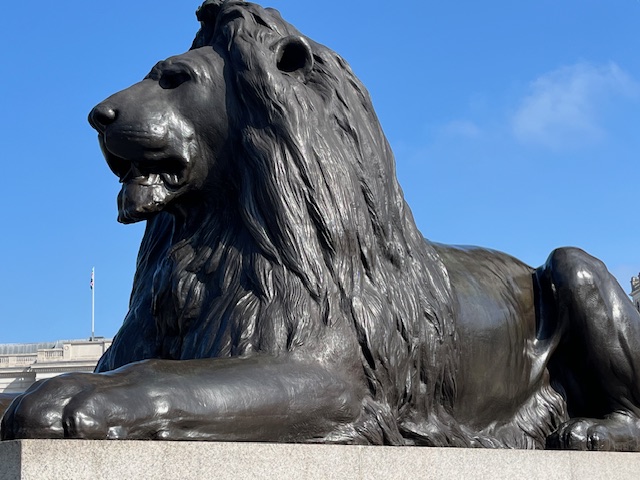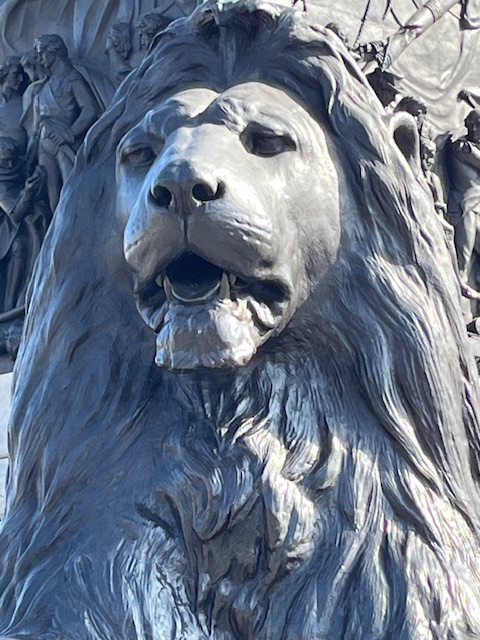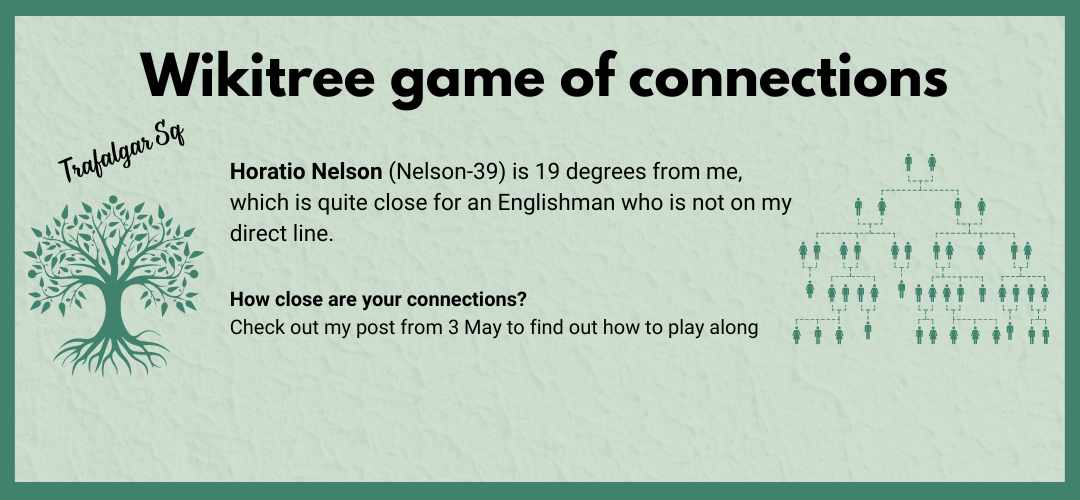Trafalgar Square, as you might expect, is named after the Battle of Trafalgar and it contains a statue of the man we have come to associate with that battle – Admiral Horatio Nelson. That was about the extent of my knowledge before this trip. So I did some digging, because I wanted to know more about what makes this place so significant.
Like most of the topics I researched for my trip, there is a lot of touristy-type information available online which I find very unsatisfying. Fortunately, my brother is a Nelson fan and he lent me his precious biography – The Life of Nelson, by Robert Southey.[1] It was published in 1813, which means Southey was a contemporary of Nelson. Contemporary sources are useful because they can provide insights into the man and the events that later writers could not have. And, of course, as a genealogist, I also checked out his family history on Wikitree.[2]
Disclaimer: I do not claim this to be a full analysis of the significance of Trafalgar and Nelson – it is just a travel blog, after all! There are some references at the end if you want to read more full accounts of his history, biography and analyses. And yes, I did use Wikipedia to save some time, but I also used other sources.
Nelson, the man
Horatio Nelson was born in Norfolk, England, in 1758 to Edmund Nelson and Catherine Suckling. He comes from a long line of Edmunds – his father, grandfather and so on back to his 3x great grandfather, which is as far as Wikitree has documented his line. He did have an older brother named Edmund, who died in infancy. His father and grandfather were both Reverends, but, at age twelve, he decided he’d rather be in the navy and his uncle, Maurice Suckling, helped him achieve this. [1]

Nelson suffered from malaria and two of his older brothers died as children, perhaps from that same disease. As a result, he ‘was never of a strong body; and the ague… had greatly reduced his strength; yet he had already given proofs of that resolute heart and nobleness of mind, which, during his whole career of labour and of glory, so eminently distinguished him.’ [1] p14
One of the things that Nelson is best known for, apart from losing an arm, is that he was considered to be a brilliant military strategist. Which leads me to my key question. Why is Nelson so famous and memorialised in Trafalgar Square?
Commemorations and memorialisations
It is ironic that, after he lost his arm during the Battle of Santa Cruz de Tenerife (Spain) in 1797, he was of the belief that, not only was his career over, but that he would pass into obscurity.
In official dispatches after the battle Nelson wrote: ‘A left-handed admiral… will never again be considered as useful; therefore the sooner I get to a very humble cottage the better, and make room for a sounder man to serve the state’; and in a letter to his wife: ‘It was the chance of war….I shall not be surprised if I am neglected and forgotten; probably I shall no longer be as useful.’ quoted in Southey [1] p138-9
Instead, Southey reports that he was ‘covered… with glory… The freedom of the cities of Bristol and London was transmitted to him. He was invested with the Order of the Bath, and received a pension of £1000 a year. The memorial which, as a matter of form, he was called upon to present on this occasion, exhibited an extraordinary catalogue of services performed during the war. It stated that he had been in four actions with the fleets of the enemy … and actually been engaged against the enemy upwards of a hundred and twenty times, in which service he had lost his right eye and right arm, and been severely wounded and bruised in his body.’ [1] p139-40
After some recuperation for his injuries, he returned to active duty, against the French and Spanish. And, as we know, this led to the Battle of Trafalgar and his death in 1805.
I’d rather quote from Southey about the impact of his death than try to summarise or paraphrase it myself, as I think his perspective is a lot more genuine than anything I can offer.
What did Nelson and his death mean to the people of England?
‘The death of Nelson was felt in England as something more than a public calamity. Men started at the intelligence, and turned pale, as if they had heard of the loss of a dear friend. An object of our admiration and affection, of our pride and of our hopes, was suddenly taken from us; and it seemed as if we had never, till then, known how deeply we loved and reverenced him. What the country had lost in its great naval hero-— the greatest of our own, and of all former times—was scarcely taken into the account of grief….It was not, therefore, from any selfish reflection upon the magnitude of our loss that we mourned for him. The general sorrow was of a higher character. The people of England grieved that funeral ceremonies, and public monuments, and posthumous rewards, were all which they could now bestow upon him’. [1] pp.373-5

‘The most triumphant death is that of the martyr…the most splendid that of the hero in the hour of victory of victory: and if the chariot and the horses of fire had been vouchsafed for Nelson’s translation, he could scarcely have departed in a brighter blaze of glory. He has left us, not indeed his mantle of inspiration, but a name and an example, which are at this hour inspiring thousands of the youth of England: a name which is our pride, and an example which will continue to be our shield and our strength.’ [1] pp.375-6
Nelson is still revered, at least by some. The Royal Navy website describes him as ‘the greatest officer in the history of the Royal Navy’ and the Encyclopedia of Britannica says that ‘He is still generally accepted as the most appealing of Britain’s national heroes.’ [6] In 2002, he was voted in the top ten of the 100 Greatest Britons in a BBC poll. Not all of the nominees were included for their historical significance. John Lennon, for example, was in position 8 ahead of Nelson. [5]
‘Spectacular success in battle, combined with his humanity as a commander and his scandalous private life, raised Nelson to godlike status in his lifetime, and after his death at Trafalgar in 1805, he was enshrined in popular myth and iconography.‘ [6]


The Battle of Trafalgar is commemorated each year on on 21 October. This battle was ‘the battle which defined the Age of Sail and which sealed British dominion of the seas for a hundred years.’ ‘Britain’s wealth, prosperity and status as a nation on the world stage still owe much to the courage and skill of the crews of the British ships and their great leader, Admiral Lord Nelson, that momentous day off Cape Trafalgar.’ [4]

Sources
- Southey, Robert, The Life of Nelson, 1813.
- Anon, ‘Horatio Nelson‘, Wikitree
- Anon, ‘Horatio Nelson, 1st Viscount Nelson‘, Wikipedia
- Anon, ‘Horatio Nelson‘, Royal Navy, accessed 29 Mar 2024
- Anon, ‘100 Greatest Britons‘, Wikipedia, accessed 29 Mar 2024; Anon, ‘BBC TWO reveals the ten greatest Britons of all time‘, BBC press release, 10 Oct 2002, accessed 29 Mar 2024
- Pocock, Tom, ‘Horatio Nelson‘, Encyclopedia Britannica, accessed 29 Mar 2024.
More information
https://www.rmg.co.uk/stories/topics/admiral-nelson-leader
Anon, ‘Nelson, Horatio‘, Napoleon.org, accessed 29 Mar 2024


